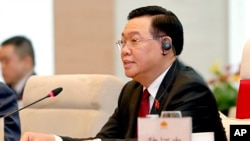The head of Vietnam’s Parliament, Vuong Dinh Hue — who was believed to be a leading contender for Vietnam's top office — has resigned amid a corruption investigation into a real estate firm. Some activists say a power struggle within the Communist Party is the underlying cause of Hue's downfall.
After a meeting Friday of the Communist Party's Central Committee, the committee announced that at his own request, Hue was stepping down from his role as chairman of the National Assembly, one of the four pillars in Hanoi's political system.
According to the Central Inspection Committee, Hue violated Communist Party regulations and these infringements have affected the reputation of the party, the state and Hue himself.
Hue's resignation is believed to be connected to corruption charges levied at one of his top aides. Pham Thi Ha, deputy head of the office of the National Assembly and Hue's assistant, was arrested Sunday over alleged power abuses.
Ha's arrest is part of an investigation into corruption at Thuan An Corporation, according to a Sunday statement from the Ministry of Public Security. Local outlet VnExpress reported that the firm was established in 2004 by its chairman Nguyen Duy Hung, and its operations include infrastructure construction, electricity and renewable energy trading, real estate and investment.
Hung was arrested April 15 on charges of violating regulations on bidding and bribery, along with five other individuals, according to a Public Security Ministry statement.
Nguyen Hong Hai, senior lecturer at VinUniversity in Hanoi, told VOA by phone Friday that Hue was well-respected and seen as a "bright star" who could have taken over the role of general secretary from 80-year-old Nguyen Phu Trong at the National Congress in 2026.
"From people who worked with him and met him before, they always praised him for his intellect and capability," Hai said of Hue, who is well-regarded as an economist and has a Ph.D. in the field. "If he did not violate the party's rules … I think it's possible that he could have been promoted to the secretary general position."
Hai added that Hue's resignation should be seen as part of General Secretary Trong's anti-corruption campaign, dubbed the Blazing Furnace, and sends the message that no one can escape the anti-graft push.
"It is a clear message from the party that there's no exception for someone who has made wrongdoings or had negative practices," Hai said.
Political infighting
Some see a power struggle for the general secretaryship as the cause of Hue's downfall.
Tran Anh Quan, a Ho Chi Minh City-based activist, told VOA on Friday that Hue's resignation shows jockeying for political status and division within the ruling Communist Party. He said that while the Communist Party used to keep infighting under wraps to give the appearance of being a "united bloc," officials now "openly harm and purge each other in a ridiculous way that everyone can see."
In March, before Hue's resignation, former President Vo Van Thuong left his position amid corruption charges. Roughly a year earlier, his predecessor, Nguyen Xuan Phuc, resigned in connection with inflation in the price of COVID-19 test kits. Vietnam's National Assembly also voted in January 2023 that two deputy prime ministers, Pham Binh Minh and Vu Duc Dam, should leave their posts.
"Vuong Dinh Hue's resignation is just a matter of political fighting, but if we really fight corruption, all communist officials would have to go to jail because everyone is corrupt," Quan wrote in Vietnamese on the messaging app Signal.
Duy Hoang, executive director of the unsanctioned Vietnamese political party Viet Tan, shared a similar sentiment Friday in a phone call with VOA. "So many leaders are tainted by corruption so it's almost now that it is being used to sideline rivals," he said of the anti-corruption effort.
Both Hoang and Quan accuse Minister of Public Security To Lam of vying for political control and using the graft crackdown to push out rivals.
"The country is being run by an 80-year-old in very frail health, and To Lam is kind of controlling things behind the scenes," Hoang said. "The Ministry of Public Security is… running these investigations, and [To Lam] is discrediting his rivals and positioning himself to be the dominant leader in the Communist Party."
If To Lam were to become the de facto leader, Hoang said, it would turn the country closer to Beijing — which he sees as an "existential threat" — worsen human rights and negatively affect the country's economy.
"To have a police general running the country would reinforce the fact that Vietnam is a police state," he said. "The security services are very paranoid about change, about Western influences, and they're very concerned about what they perceive as peaceful evolution."
Still, Hai said that although To Lam is one of a few candidates for general secretary, there isn't any proof that his ambitions are related to the recent leadership resignations.
"I think it's very hard to confirm whether or not it is political infighting because no one has that kind of evidence," Hai said.








